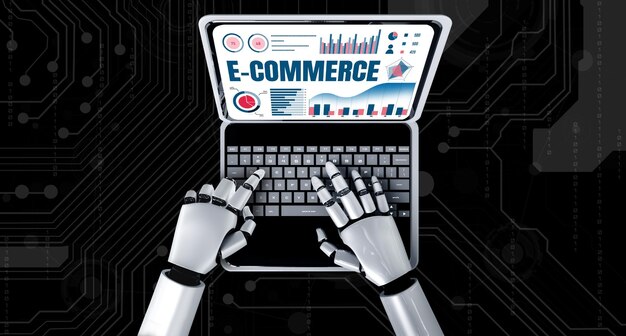
Estimated reading time: 8 minutes
Key Takeaways
- AI and ecommerce outsourcing can revolutionise online retail operations
- Integrated AI-powered solutions boost efficiency and customer experience
- "Automation" frees up human resources for strategic tasks
- Data-driven marketing leads to higher conversions and improved retention
- Staying ahead of trends ensures long-term success
Table of Contents
In the rapidly evolving digital landscape, the integration of artificial intelligence (AI) in ecommerce outsourcing is reshaping the online retail ecosystem. By combining AI in ecommerce outsourcing with strategic partnerships, businesses can unlock substantial growth opportunities and operational efficiencies. This powerful combination offers a competitive edge that is increasingly essential in today’s marketplace.
AI in ecommerce outsourcing involves implementing artificial intelligence solutions within outsourced operations—from automated inventory management to personalised marketing campaigns. With the global outsourcing industry continually expanding, retailers of all sizes can benefit from AI-powered ecommerce solutions, accelerating everything from customer support to data analysis.
Below, we explore the benefits, key AI technologies, effective AI SEO strategies, and real-life success stories of this modern approach to online retail. Whether you run a small boutique or manage a large-scale ecommerce platform, strategically leveraging AI in outsourced operations can boost your efficiency, customer satisfaction, and overall profitability.
Benefits of AI-Powered Ecommerce Outsourcing
Ecommerce Automation
Automation is a game-changer for businesses looking to reduce manual tasks and errors. Through AI-driven systems, tasks such as inventory tracking, order processing, and customer inquiries are handled efficiently. This not only cuts costs but also frees employees to work on strategic initiatives.
- Automated inventory management ensures you maintain optimal stock levels
- AI-powered order processing expedites fulfilment
- AI-driven customer support resolves routine queries instantly
Data-Driven Marketing
The ability to analyse large datasets in real time revolutionises marketing. AI solutions deliver insights into customer behavior, enabling highly personalised campaigns and product recommendations. This targeted approach significantly elevates engagement and conversion rates, while fostering customer loyalty.
Trend Prediction
Forecasting future demand is critical for strategic decision-making. By examining customer data and broader market trends, AI tools can highlight emerging opportunities and guide proactive inventory planning. Staying ahead of shifting demands results in timely product launches and higher profitability.
Key AI Technologies in Ecommerce
Natural Language Processing (NLP)
NLP allows machines to interpret human language, facilitating more intuitive customer interactions. Chatbots and virtual shopping assistants powered by NLP can handle inquiries and offer recommendations around the clock. This capability also extends to sentiment analysis, enabling businesses to gauge customer satisfaction and adjust offerings accordingly.
AI-Driven Content
Content creation is central to ecommerce success, and AI can automate significant portions of it. Tools now generate product descriptions and articles that are SEO friendly, engaging, and customer-focused. Leveraging AI in content creation dramatically reduces time to market for new products and campaigns.
Chatbot Integration
Online retailers benefit immensely from integrated chatbot solutions. 24/7 availability ensures customers can always find support, while automated responses alleviate routine tasks. Beyond handling FAQs, advanced chatbots also provide personalised product suggestions that augment user experiences.
AI SEO Strategies for Ecommerce
AI Keyword Research
AI-driven keyword tools delve into user intent and predict emerging trends with a high degree of accuracy. Such insights inform content strategies, enabling ecommerce sites to stay aligned with audience interests while minimising wasted marketing spend.
Content Optimisation
After identifying the right keywords, AI can further enhance your content by restructuring pages and injecting semantic elements. Such optimisations strengthen search engine visibility and improve overall user engagement, translating into lasting benefits for your brand.
Voice Search Optimisation
As smart speakers and voice assistants proliferate, aligning content with conversational queries becomes increasingly important. AI solutions can evaluate voice-based search patterns, guiding retailers to develop more natural phrases and broaden their reach to on-the-go customers.
Internal Linking Strategies
Proper internal linking boosts domain authority and user navigation. Advanced AI algorithms locate optimal linking opportunities across the site to enhance user journeys and SEO performance. This strategic linking encourages higher page views and deeper engagement.
Ecommerce Outsourcing with AI
SEO Outsourcing
Outsourced SEO teams equipped with AI-driven tools deliver scalable solutions for everything from keyword research to on-page optimisation. Data-backed link-building strategies further amplify your organic reach, allowing you to compete effectively in saturated markets.
Product Description Optimisation
Maintaining consistency in product descriptions is crucial for large catalogs. AI tools not only speed up content creation but also ensure each description follows search-friendly guidelines and resonates with target audiences, ultimately driving sales and customer satisfaction.
AI-Powered Ecommerce Platforms
Modern outsourcing partners often provide end-to-end ecommerce platforms integrated with AI functionalities. Beyond automating back-end tasks, these platforms provide advanced analytics, real-time reporting, and even marketing integrations that simplify multi-channel campaigns.
Implementing AI in Outsourced Ecommerce Operations
Integration Steps
- Outline precise goals for AI adoption
- Pick appropriate AI solutions that align with objectives
- Merge AI tools into existing platforms seamlessly
- Track and refine performance metrics regularly
Best Practices
Establish consistent, transparent communication with your AI-focused outsourcing partners. This ensures all parties share the same vision and objectives. Additionally, highlight data security and compliance, protecting both your business and your customers.
Seamless Integration
A phased approach minimises the risks of significant operational disruptions. Opt for outsourced partners renowned for successful AI integration to guarantee minimal downtime and high compatibility across platforms.
Case Studies and Success Stories
Example 1: Fashion Retailer X
By outsourcing inventory management to an AI-centric partner, this retailer saw tangible improvements:
- 30% drop in stockouts
- 25% higher inventory turnover
- 15% boost in profit margins
Example 2: Electronics E-tailer Y
Implementing AI-powered chatbots for support yielded:
- 40% reduction in service costs
- Continuous customer support availability
- 20% bump in satisfaction scores
Future Trends in AI for Ecommerce Outsourcing
Innovations like more advanced NLP, image recognition, and hyper-personalisation are set to redefine ecommerce further. Outsourcing providers that integrate these breakthroughs will offer clients unprecedented control over inventory, service, and marketing strategies.
Conclusion
Embracing AI in outsourced ecommerce operations is no longer optional—it’s an imperative for growth and sustainability. By weaving AI solutions into core business processes, online retailers can refine operational efficiency, deliver meaningful customer interactions, and stay responsive to market changes.
As we’ve seen, AI technologies are indispensable for forward-thinking brands. From predictive analytics to chatbot assistance, these solutions amplify productivity and profits. Through strategic implementation and the guidance of capable outsourcing partners, businesses can cultivate a robust online presence and secure long-term success in a dynamic digital landscape.
For additional insights, take a look at
PwC’s AI Predictions Report
and the
Ecommerce AI Implementation Guide by Cubix. These resources offer deeper dives into the evolving role of AI across various industries.
FAQs
How does AI outsourcing benefit online retailers?
AI outsourcing streamlines operations by automating tasks like inventory management and customer support, reducing overhead costs, and freeing staff to focus on growth strategies.
What is the biggest advantage of data-driven marketing?
It targets customers with highly personalised campaigns, leading to stronger engagement, higher conversion rates, and a more loyal customer base.
Are AI-powered chatbots essential for modern ecommerce?
Yes, chatbots offer 24/7 support and immediate responses, significantly improving customer satisfaction and reducing service costs, especially for routine inquiries.
How does voice search affect SEO strategies?
Voice searches tend to be more conversational. AI helps adapt content to these natural language queries, ensuring better visibility in voice-driven search results.
What improvements can outsourced AI providers deliver?
They bring advanced tools and expertise, offering enhanced product descriptions, SEO strategies, data analytics, and seamless platform integrations to boost ecommerce profitability.






